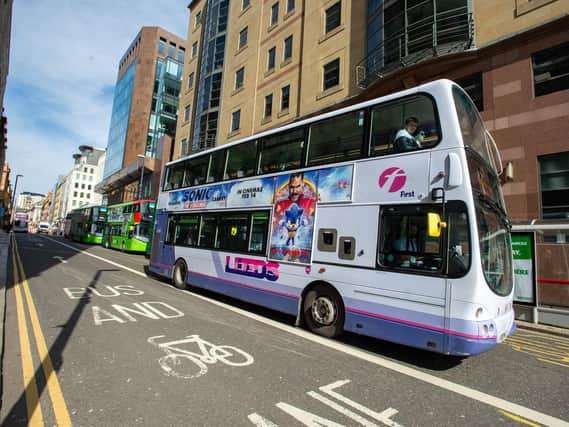It is impossible to imagine an effective transport system without buses - Andrew Jones MP


It is great to hear colleagues talk so much about buses.
As the Minister responsible for the Bus Services Act 2017, I have to say that there were not that many voices in support of buses then.
It was like “You what?” from colleagues at the time, but buses seem to be much more in favour at the moment, and that is a good thing.
Advertisement
Hide AdAdvertisement
Hide AdThe deregulation of buses, however, was not a cause of bus use decline.
In the 30 years leading up to deregulation in 1985, passenger numbers on buses went down from 15.5 billion to 5.5 billion passenger journeys per year. That is an average decline of two per cent a year.
Since deregulation, yes indeed, passenger numbers have continued to go down, but they have gone down at the significantly reduced rate of 0.2 per cent per year.
I think that those who were responsible for bus deregulation in the 1980s could easily make the case that they went into new territory and saved the bus industry from its precipitate decline. But let’s not worry about that.
The key thing is that we have a new enthusiasm for buses.
Advertisement
Hide AdAdvertisement
Hide AdBuses are the hard yards of our public transport system. It is impossible to imagine a good, effective transport system without buses at its heart.
The drive towards more environmentally-friendly buses, particularly electric-powered buses such as those we have in Harrogate, will be popular right across the country.
We have now seen the publication of the response to the Williams review on the future of the railways.
Again, we have questions about how to take things forward from a position of more strength.
Advertisement
Hide AdAdvertisement
Hide AdWe have 140,000 services per week in our country, which is the highest level in our history. Passenger numbers have grown to 1.8 billion – a billion more passenger journeys a year since rail privatisation.
People have been choosing rail, which has been a key ingredient of economic progress in this country ever since railways were invented.
Railways helped to drive the Industrial Revolution and made the UK the economic powerhouse that it has been. It will be interesting to see how we build on that to make it even better.
There is no doubt in my mind that the system was over-complex and needed reform, and I look forward to the work that has taken place in the Department for Transport, and the Williams review.
Advertisement
Hide AdAdvertisement
Hide AdI ask Ministers to consider two others areas. The first is connectivity to ports – sea ports and airports; goods and people.
Liverpool2 is an example of an interesting port development. Improving access to maximise that investment is not easy, given its location, but it is important to grasp that nettle.
Leeds Bradford Airport involves a different mode of transport. Some years ago, more people were leaving Yorkshire to travel from Manchester Airport than travelled from Yorkshire itself. If we could improve airport capacity and connectivity within Yorkshire, a significant amount of journeys would become unnecessary.
Finally, I am a big supporter of HS2 and Northern Powerhouse Rail, which includes delivering the eastern leg of
HS2.
Advertisement
Hide AdAdvertisement
Hide AdIt is important to separate the trans-Pennine rail upgrade from Northern Powerhouse Rail.
Northern Powerhouse Rail is about fast connectivity between the cities of the north; the trans-Pennine rail upgrade is about connectivity into the slightly smaller towns and cities – the Huddersfields, or wherever.
There is a difference between into and intra. That is not widely understood, but it is significant. The projects do different jobs, and both need to proceed.
Andrew Jones is the Conservative MP for Harrogate and spoke in a House of Commons debate on transport. This is an edited version.
Comment Guidelines
National World encourages reader discussion on our stories. User feedback, insights and back-and-forth exchanges add a rich layer of context to reporting. Please review our Community Guidelines before commenting.